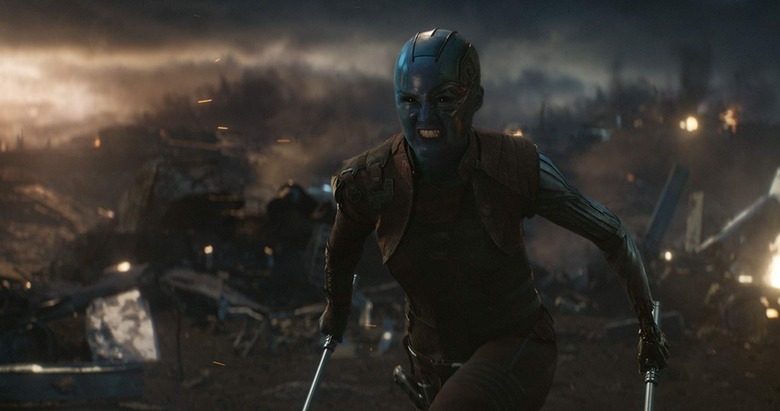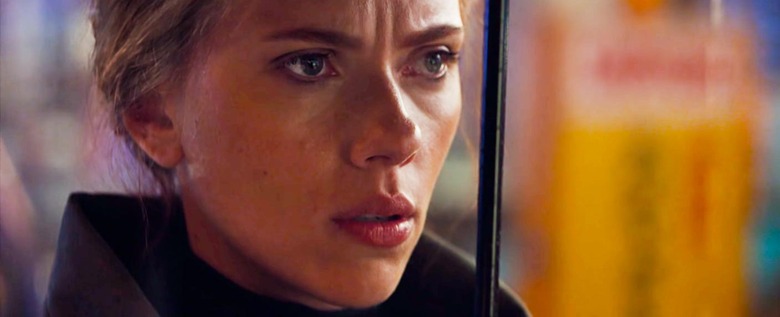The Women Of Marvel Deserved More In 'Avengers: Endgame'
(Welcome to The Soapbox, the space where we get loud, feisty, political, and opinionated about anything and everything. In this edition: Avengers: Endgame doesn't honor its female characters in a way that actually carries weight.)
There's no question that Marvel has a women problem. In the past decade and over the course of its 22 movies, only one of them was led by a woman, and one had a woman sharing the title. But the studio has been eagerly trying to make up for it in recent years, releasing Captain Marvel to critical and box office acclaim, and slowly introducing female fan favorites — some of whom would go on to get double billing in the big established movies.
As we headed into Avengers: Endgame, the Marvel Cinematic Universe was filled to the brim with strong, complex, rich female characters — some super, some not — who were on course to outshine even some of the male heroes. And with Marvel reportedly pushing for more female superheroes in front of and behind the camera, it is no surprise that the film would want to pay its respects to these beloved characters. But this is where the film stumbles.
Spoilers for Avengers: Endgame below.
Girl...Power?
The moment that got one of the loudest rounds of applause in my movie theater (and likely, in thousands of movie theaters across the world) was one the one featuring all the female superheroes in the Marvel Cinematic Universe. It was empowering, inspiring, and signified a promise of a bright future that is female. But, unfortunately, it's a promise that rings false.
The big on-screen team-up takes place when Spider-Man (Tom Holland) is nearly struck down while trying to pass the Iron Gauntlet on to Ant-Man and the Wasp so that they can send the Infinity Stones back in time. Tired from evading Thanos' army, Spidey passes on the Gauntlet to Captain Marvel, who has just conveniently appeared to turn the tide of the battle. "How are you going to get it past all of that?" Spider-Man timidly asks Captain Marvel. "With our help," a chorus of female voices say, emerging from the rubble of the battlefield to take their superhero poses. Valkyrie (Tessa Thompson), Scarlet Witch (Elizabeth Olsen) Okoye (Danai Gurira), the Wasp (Evangeline Lilly), Rescue (Gwyneth Paltrow) and a slew of other female characters get in formation in an awe-inspiring moment designed to elicit applause and signal that Marvel was woke and feminist now. Just look how many female characters there are, and how awesome they look! No matter that none of these characters have crossed paths before, or that they seemed to have heard some kind of "woman radar" that gathered them all together.
It was a satisfying fan-service moment that was built up from...nothing. You only have to look at Marvel's track record with female characters to see what shaky ground this moment was standing on: It took 20 movies with (increasingly similar-looking) male protagonists before Marvel released its first film built around a female superhero. Lilly's athletically and intellectually superior Hope van Dyne had to wait a whole movie before she got to suit up, and she only got double-billing with Paul Rudd's Ant-Man. Zoe Saldana's infinitely more compelling Gamora suffered the same fate, getting sidelined by Chris Pratt's Peter Quill, only to get a subplot in Guardians of the Galaxy Vol. 2. Mantis (Pom Klementieff) spent the entirety of that film being made the butt of a joke. And there's the sense that Thor: Ragnarok's Valkyrie and Black Panther's Okoye and Shuri only became such dynamic characters thanks to the screen presence of their individual actors. Let's not even talk about Pepper Potts' entire offscreen arc that somehow resulted in her becoming a superhero, no questions asked. Nebula (Karen Gillan) has the most compelling development of any character in Avengers: Endgame, resulting in a cathartic moment in which she kills her former abused self and moves on to a more hopeful future — in a scene that arguably has its own issues.
I know it seems unfair to use Marvel's poor history with its female characters against Avengers: Endgame, which does take care to give its (limited) female characters their proper due. But Avengers: Endgame is built entirely around reckoning with the past and its own history. So when you take in stock all the marquee moments that take place in the battlefield, the only one that doesn't have years of development building up to it is that "girl power" moment. It's a shallow, cheap gesture at gender equality that feels like too little, too late.
The Sacrifice of Black Widow
But perhaps the apotheosis of the Marvel's shaky track record with female characters is the one that started it all: Black Widow. Scarlett Johansson's assassin was the lone woman in a testosterone-filled team, and easily held her own against billionaires, super soldiers, and gods. She quickly became beloved by fans, who demanded that she get her own movie (which she finally will, after the hype has nearly died down). Now finally, in Avengers: Endgame, she gets something akin to a full-fledged character arc. But why does it feel like that's not enough?
Through the five films in which she's appeared, Black Widow's characterizations has changed as frequently as her bad wigs. In Iron Man 2, she's a steely sexpot; in Avengers, she's a tortured killer; and most egregiously in Avengers: Age of Ultron, she's a tragic "monster." The Russo brothers were the first to get a handle on a defining characterization of Black Widow in Captain America: Winter Soldier: a lonely, mistrustful reformed killer who is seeking some kind of redemption. But as the MCU became more packed with characters and stuff, Black Widow's arc was sidelined again and she was relegated simply to Captain America's (Chris Evans) righthand man in Captain America: Civil War and Avengers: Infinity War.
With the slow-moving, almost meditative nature of Avengers: Endgame, it seemed like Black Widow could finally get her story arc back on track. And she does get a fair amount to do — she is the one that most heavily shoulders the grieving process following Thanos' snap, taking control of Avengers HQ and trying to piece the universe together. But as Black Widow mourns the loss of half the world and struggles to come to terms with her best friend Hawkeye (Jeremy Renner) cutting a bloody streak through what remains, there's no indication of her internal journey other than "she's really sad." She failed the world, yes, but why does she in particular seem to be even more griefstricken than the other heroes? She sacrifices her own peace of mind to keep the team going, but for what reason?
It all leads up to Black Widow making the ultimate sacrifice on Vormir, when she and Hawkeye learn that one of them must die in order to gain the Soul Stone. Both of them are ready to lay down their lives, but Hawkeye is established with having more to lose because of his nice suburban family. Black Widow has...her job? The only thing ostensibly tying Black Widow to the world is her grief, which doesn't explain her readiness to give up her life. Her lack of a character arc can be mostly blamed on her inconsistent characterization, but when she dives off that cliff, the feeling that it generates is not sadness, but inevitability.
If you really look hard, Black Widow's arc is one marked by tragedy: She is raised in a hellish environment to be a cold-blooded assassin, but switches sides and finds new purpose in what she thinks is a altruistic organization. But when she learns that that agency, S.H.I.E.L.D. was evil in disguise, she finds a new family — the Avengers — that get torn apart as quickly as they were together. So to save and reunite that family, Black Widow is given no choice but to sacrifice herself for it.
It would be poignant if Black Widow was given her due. But even in her death she gets no more than a brief, rage-filled scene of mourning and a single mention after Tony Stark's lavish funeral. When the big "girl power" moment happens, Black Widow is barely thought of. That's Black Widow's biggest tragedy: that she ended up forgotten.


